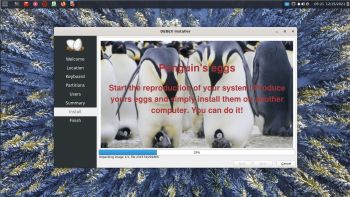 About DebEX Barebone Budgie/Gnome/Enlightenment, DebEX Gnome and DebEX KDE Plasma Linux 64 bit
About DebEX Barebone Budgie/Gnome/Enlightenment, DebEX Gnome and DebEX KDE Plasma Linux 64 bit
All three systems/distributions are based on Debian. Budgie Desktop 10.5, Gnome 40 and Enlightenment 0.24.2 are used as Desktop environments in DebEX Budgie/Gnome/Enlightenment Build 211215. Gnome 3.38 is used in DebEX Gnome. KDE Plasma Desktop 5:20 is used in DebEX KDE. The system language is English (in all three versions of DebEX).
NEWS 211215 about DebEX Budgie/Gnome/Enlightenment – a penguins-eggs Build
A new version of DebEX – based on Debian Sid (unstable) – with Budgie Desktop 10.5, Gnome 40, Enlightenment 0.24.2 and kernel 5.15.5-exton-amd64-rt21 is ready. All packages have been updated to the latest version as of December 15, 2021.
Most important Changes
When you start up DebEX Build 211215 live (from a DVD or a USB stick) you will end up logged in as the ordinary user user to the Budgie Desktop. The password for user is live. You can log out from Budgie and log in again to Gnome or Enlightenment. You can also log in from LightDM as root (super admin). The password for root is root. NOTE: You can’t log in to the Enlightenment Desktop when running DebEX Build 211215 in VirtualBox or VMware. You can use the Calamares 3.2.48-1 Installer Framework to install DebEX Budgie/Gnome/Enlightenment to your computer in any language. You can even use Calamares in VirtualBox and VMware – i.e. non-efi computers. Watch this animated GIF. My other DebEX builds were created with Refracta Snapshot. This DebEX Build (211215) is, however, created with a remaster tool called penguins-eggs. Very easy to handle. Penguins-eggs is a console utility, in active development, who let you to remaster your system and redistribute it as iso images or from the lan via PXE remote boot. You can use penguins-eggs in any Debian/Ubuntu system installed to hard drive. Basically you only need to start up a terminal and run the command sudo eggs dad -c. Then just follow the instructions – see the screenshots below. If you haven’t installed Calamares you will be asked to do so. Do that even if you already have Calamares installed. A system/ISO built with penguins-eggs must use a special Calamares version to be installable. Penguins-eggs is developed by Piero Proietti. It is based on Remastersys, Refracta, Systemback and father Knoppix.
How-to use penguins-eggs
1. Install DebEX (or any other Debian/Ubuntu based system) to hard drive
2. Change everything to your liking
3. Open up a terminal and run the command sudo eggs dad -c
Screenshot 1 – NOTE: If you choose fast your new ISO will be ready in about five minutes (even in VirtualBox). If you choose max it will take about two hours (in VirtualBox), but the ISO will be about 500 MB smaller. (As regards new builds of DebEX Build 211215). A smaller ISO has one disadvantage. It doesn’t boot as fast as the one built using the option fast.
4. Go on choosing Yes
Screenshot 2
5. Go on choosing Yes
Screenshot 3
6. Go on choosing Yes
Screenshot 4
7. You new ISO is ready!
Screenshot 5
NOTE: You can remaster DebEX in VirtualBox or VMware if you want. VirtualBox Guest Additions are pre-installed so you can run DebEX in full screen in VirtualBox. Watch this screenshot.
OTHER SCREENSHOTS
1. The Budgie Desktop for the ordinary user user
2. The Gnome Desktop for user
3. The Enlightenment Desktop for user
4. The Boot menu when running DebEX live
5. The Boot menu when running DebEX from hard drive (in VirtualBox)
6. A Samba connection in DebEX – a way to transfer your new ISO to another computer
7. Installing and running Spotify in DebEX
andex.exton.net – latest is AndEX 10 (with GAPPS) and AndEX Pie 9.0 (also with GAPPS)!
and
about my Android 11, 10, Pie, Oreo, Nougat, Marshmallow and Lollipop versions for Raspberry Pi 4 and 3/2 at
raspex.exton.se – latest is RaspAnd 11 (with GAPPS) and RaspAnd Oreo 8.1 (also with GAPPS)!

